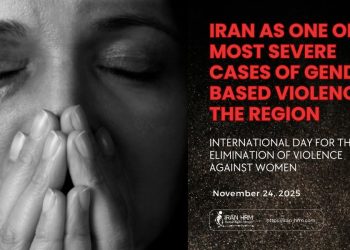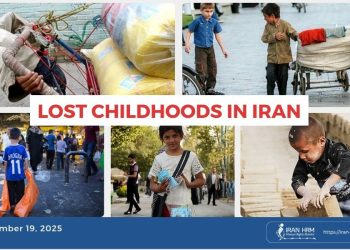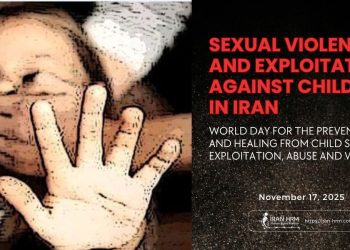On the occasion of the International Criminal Justice Day – 17 July 2025
Introduction
July 17 marks the anniversary of the adoption of the Rome Statute in 1998 and is celebrated globally as the Day of International Criminal Justice. The establishment of the International Criminal Court (ICC) was a major step toward ending impunity for the gravest crimes, including genocide, crimes against humanity, war crimes, and the crime of aggression. While many countries have taken steps toward these goals, the ruling regime in Iran remains a stark example of systematic disregard for international criminal justice.
A Judiciary Lacking Independence – A Tool of Repression
The Iranian judiciary is not independent. It is fully subordinate to security and intelligence bodies such as the IRGC (Islamic Revolutionary Guard Corps) and the Ministry of Intelligence. This structural subjugation has led to:
- Judicial rulings based on political and security considerations;
- Direct interference of security agencies in arrests, interrogations, and sentencing;
- Penal laws being instrumental use to suppress dissent and civil activism.
Crimes Against Humanity: The 1988 Massacre
In the summer of 1988, thousands of political prisoners were executed by decree of Ayatollah Khomeini and under the authority of “Death Committees.” Estimates put the number of victims Tens of thousands. These executions, carried out solely on ideological and political grounds without due process, are clear examples of crimes against humanity under Article 7 of the Rome Statute. Mass graves, refusal to hand over bodies, and lack of death certificates underscore the inhumanity of this crime.
Suppression of the 2022 Protests and Extrajudicial Killings
During the 2022 “Woman, Life, Freedom” uprising, security forces used live ammunition and deliberately shot protesters in vital body parts. Hundreds were killed, including minors. These targeted killings, in lieu of any proportional policing, constitute clear acts of extrajudicial execution as part of a systematic attack on civilians—falling under crimes against humanity (Article 7, Rome Statute).
Systematic Torture in Prisons
White torture (solitary confinement, sensory deprivation, isolation) and physical torture (beatings, sexual violence, electric shocks, suspension) are systematically used against political and religious prisoners. These methods are employed in IRGC and Intelligence Ministry detention centers. The widespread, repeated, and structured use of such torture places it within the realm of crimes against humanity.
Structural Discrimination and Persecution of Minorities, Women, and Children
Ethnic minorities (Kurds, Baluchis) and religious minorities (Baháʼís) are subjected to systemic discrimination, arbitrary detention, execution, educational deprivation, and destruction of religious sites.
Women face compounded discrimination—from employment and legal inequality to forced hijab enforcement, gender-based violence, and arrest for protest participation. Reports confirm the detention and abuse of hundreds of women, and Femicide has reached alarming levels, with at least 179 documented killings in 2024.
Children are not spared either. They have been targeted directly during protests (e.g., Kian Pirfalak, Sarina Esmailzadeh), executed despite being under 18 at the time of alleged offenses, or denied access to education due to their faith or ethnicity. These sustained patterns amount to “persecution of an identifiable group,” prosecutable under Article 7 of the Rome Statute.
Instrumental Use of the Death Penalty
Iran maintains the highest per capita execution rate globally. In 2024 alone, at least 993 and in 2025 till 15 July 691 executions were recorded. Over half were related to non-violent drug offenses. Juvenile executions and death sentences against protesters without fair trials constitute violations of international standards and if systematic may fall under ICC jurisdiction.
Specific Incidents of Recent Crimes
- The 1988 Massacre
- Bloody Friday of Zahedan: killing Hundreds worshippers on 30 September 2022
- Mass executions on 7 August 2024
- Increase in arrests and executions following the June 2025 attacks
Impunity and Denial of Justice
From the 1988 massacre to the present, not a single high-ranking perpetrator of these mass crimes has been held accountable. Many still hold positions of power. Efforts to destroy mass graves, threaten families, and suppress truth-seeking show the regime’s active role in perpetuating and concealing crimes.
Call for International Action
- Opening a case against Iran at the International Criminal Court;
- Invoking universal jurisdiction by states with relevant national legislation;
- Supporting international initiatives for an independent truth commission on the 1988 massacre and 2022 protests;
- Imposing targeted sanctions on human rights violators;
- Pressuring Iran to cooperate with UN mechanisms and accede to the Rome Statute.
Conclusion
Under the principles of international criminal law, there is sufficient evidence to investigate crimes committed by the ruling regime in Iran. The Day of International Criminal Justice must serve as a rallying point for global efforts to end impunity and restore dignity and justice to victims.







